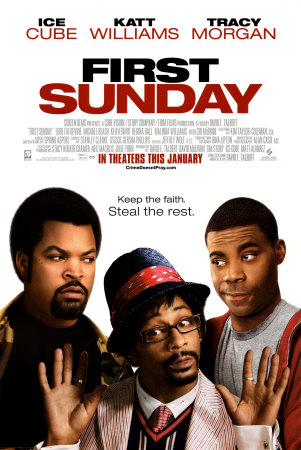
FIRST SUNDAY
US, 2008, 98 minutes, Colour.
Ice Cube, Tracy Morgan, Loretta Devine, Michael Beach, Keith David, Regina Hall, Malinda Williams, Chi McBride?.
Directed by David E. Talbert.
This is a particularly local film and does not travel too well beyond the ‘hoods of the American cities.
It has its heart in the right place and is an African American comedy drama that serves as a moral fable about violence and robbery as anti-social. It has more than a dollop of religion. It is a variation on the inspirational movie for its target audience: poorer black families in the suburbs and their children.
The style and sensibility are distinctive and could prove popular to groups in other countries who find themselves ghettoised as well as targets of overt or hinted at racial prejudice.
Ice Cube as actor has been appearing in more and more of this kind of film and has his own company Cube Vision who produced First Sunday. He plays a Darrell, a man who has spent a lot of time in homes and gaol and who can’t settle down, a lot of the fault being his school friend Lee John who gets them involved in harebrained schemes which finish up in court. Lee John is played by comedian Tracy Morgan (30 Rock and Saturday Night Live) who is often in your face – and you wish he would just shut up now and again! This is all highly extraverted stuff from most of the characters. Darrell doesn’t want his son to go with his mother to live in Atlanta, away from Baltimore. So, what do they do? Decide to rob the local church – and a more inept robbery on screen has yet to be seen.
But, you know it is going to end happily but may well be wondering how. There is lots of exuberant African American religious music, clapping and dancing, praying and quoting the Gospel. There is plenty of forgiveness and making amends – and in 2008 a glimpse of a lot of people who will vote for Barak Obama.
1.The target audience for this film? African Americans? Americans concerned about life in the city ghettos? About crime? About inspiration and reform?
2.The Baltimore settings, homes, streets, the church? The musical score? The use of Gospel music?
3.The title, the reference to the church, the importance of the church?
4.The focus on Durell and Lee John? Their characters, Durell and his seriousness? LeeJohn? and his constant patter? Friends since schooldays? Their schemes together? In court, in prison? The dependence on each other?
5.Durell, love for his son, separation from his wife? Her harsh attitudes, her work, beauty, the clients at home? Her wanting to move to Atlanta? Durell and his son, the boy not wanting to go to Atlanta? Durell making the promise?
6.Jobs, Lee John and his scheme, the television set, Durell and his honesty, being sacked? The collage of trying to get jobs, his being rejected? Lee John and the scheme with the wheelchairs, the Jamaicans, the threats? The chase by the police, the chairs being lost, the arrest? Going to court – and the performance of the attorneys, the attitude of the judge? His keeping everybody quiet? Sentencing them to community service?
7.Going into the church, the hymns, the energy of the conductor? The deacon, the money? The pastor and his presiding? His sermons, hope? The people in the church? Sister Doris? Tianna and her father?
8.The decision to rob the church? Getting in, everything going wrong? The most inept robbery? The safe, the explosion? The encounter with the deacon? His hedging? The meeting with Sister Doris, her concern, the little boy she cared for? The exasperation? Their having to go into the church? Durell and his declaring it was a robbery? Tying up the pastor? The reaction of Tianna? The reaction of the deacon? The opening of the safe, the money missing? Suspicions? Everybody being interrogated?
9.The blind and deaf handyman, his finding the money? The deacon, his reaction, his lies?
10.Everybody hot, Durell’s ability with machinery, his fixing the air-conditioning? His son ringing, answering him, helping him with his own electronics? The reaction of the group, the various people and their being hot, then sympathetic, the food and Doris providing it? The discussions? Tianna and her tough stances? The police outside, wanting to investigate, their being put off?
11.The reality of what happened to the money, the deacon and his documents, falsifying them? Tianna discovering them?
12.The plan, the sympathy of the congregation, the pastor, untied, helping the two get out of the church, their being pursued? Being taken?
13.In court, the reaction of the congregation, Sister Doris and her support, the boy? The judge and his exasperation? The lawyers and their performance? The deacon and his wanting to be a witness? Tianna, the documents, the expose? The judge throwing the case out?
14.The congregation giving the needed money to Durell, the money for his wife to stay? His visit, her agreement, his son’s happiness?
15.Lee John, his character, the stand-up comedy, his patter? His friendship with the boy, with Sister Doris?
16.African American humour, American style – how well did it travel beyond the cities?